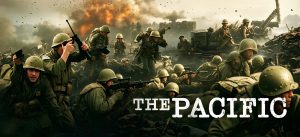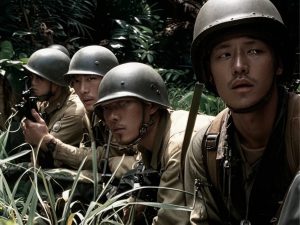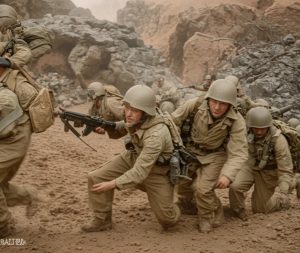The Pacific (2010) is a ten-part HBO miniseries that captures the grueling experience of the U.S. Marines fighting in the Pacific Theater during World War II. Produced by Tom Hanks, Steven Spielberg, and Gary Goetzman, it serves as a companion to the earlier Band of Brothers but brings a distinct focus on the harrowing combat between American and Japanese forces. The story weaves together the lives of three Marines based on real historical figures: Robert Leckie, Eugene Sledge, and John Basilone, drawing from Leckie’s memoir Helmet for My Pillow, Sledge’s With the Old Breed, and other firsthand accounts.

Here’s a closer look at the main characters:


Eugene “Sledgehammer” Sledge (Joseph Mazzello)
Eugene Sledge, a sensitive yet determined young man from Alabama, is initially too frail to enlist but finally joins the Marines in 1943. His journey is marked by a progression from innocence to harsh experience as he faces the horrific realities of war. Sledge’s character development is central to the series, portraying the psychological toll of battle as he encounters the brutality of combat in Peleliu and Okinawa. Mazzello’s portrayal shows Sledge’s gradual transformation and the enduring impact of trauma.
Robert Leckie (James Badge Dale)
Robert Leckie, a writer and a poet, is one of the earliest characters the series introduces, depicting him enlisting in the Marines after the attack on Pearl Harbor. Leckie’s character brings a reflective lens to the war; he is a compassionate yet resilient Marine who suffers from both physical and mental hardships throughout the campaign, including enduring intense combat in Guadalcanal and the harrowing jungle warfare in Cape Gloucester. Through Leckie, the series explores themes of disillusionment and mental anguish, as well as the brotherhood among soldiers.
Gunnery Sergeant John Basilone (Jon Seda)
John Basilone, a legendary Marine and Medal of Honor recipient, brings a different angle to the series. Known for his heroics during the Battle of Guadalcanal, he becomes a national icon. After returning stateside for a bond tour, Basilone struggles with his fame and eventually returns to the front lines, longing to serve alongside his fellow Marines. His story concludes with his tragic yet heroic death at the Battle of Iwo Jima, adding a deeply patriotic but somber layer to the miniseries.
Notable Themes and Battles
The Pacific stands out for its intense realism and cinematography that unflinchingly depicts the visceral and savage conditions of jungle warfare. Major battles like Guadalcanal, Cape Gloucester, Peleliu, and Okinawa are dramatized with detailed attention, showcasing the conditions Marines endured, from tropical diseases to the exhausting, hand-to-hand combat.
The series also delves into broader themes, such as:
- Psychological and Moral Struggles: Beyond the battles, The Pacific explores the mental breakdowns and moral conflicts the soldiers faced. The series doesn’t shy away from showing how exposure to the brutality of war affects each Marine, particularly as they confront the dehumanization and alienation that come with sustained combat.
- Brotherhood and Loss: While the series showcases camaraderie among the Marines, it equally emphasizes the trauma of losing friends in battle. This theme is particularly pronounced in Sledge’s narrative as he grapples with the bonds he forms, even as those around him fall.
- The Homefront Disconnect: When Basilone returns to the U.S. for a bond tour, the contrast between civilian life and the front lines is starkly portrayed. Basilone’s alienation highlights the difficulty of bridging the gap between the warriors’ realities and the public’s perception of the war effort.
Production and Reception
Filmed in Australia, The Pacific features large-scale sets and advanced visual effects, enhancing the authenticity of its war scenes. The budget of approximately $200 million allowed for impressive realism, with the production team meticulously recreating jungle and battlefield conditions.
The series earned widespread acclaim for its intense performances, storytelling, and visual execution, winning eight Emmy Awards, including Outstanding Miniseries. However, The Pacific’s darker, more introspective approach to the war drew mixed reactions compared to Band of Brothers. Some viewers found its disjointed narrative challenging, given its focus on individual stories rather than a single company, but this approach ultimately highlighted the diverse, personal experiences of those in the Pacific Theater.
In summary, The Pacific is a powerful, unflinching portrayal of WWII’s Pacific Theater, emphasizing the human costs of war, the resilience of soldiers, and the complex psychology of combat. It remains a significant work for its depth, realism, and respect for the stories of real Marines.